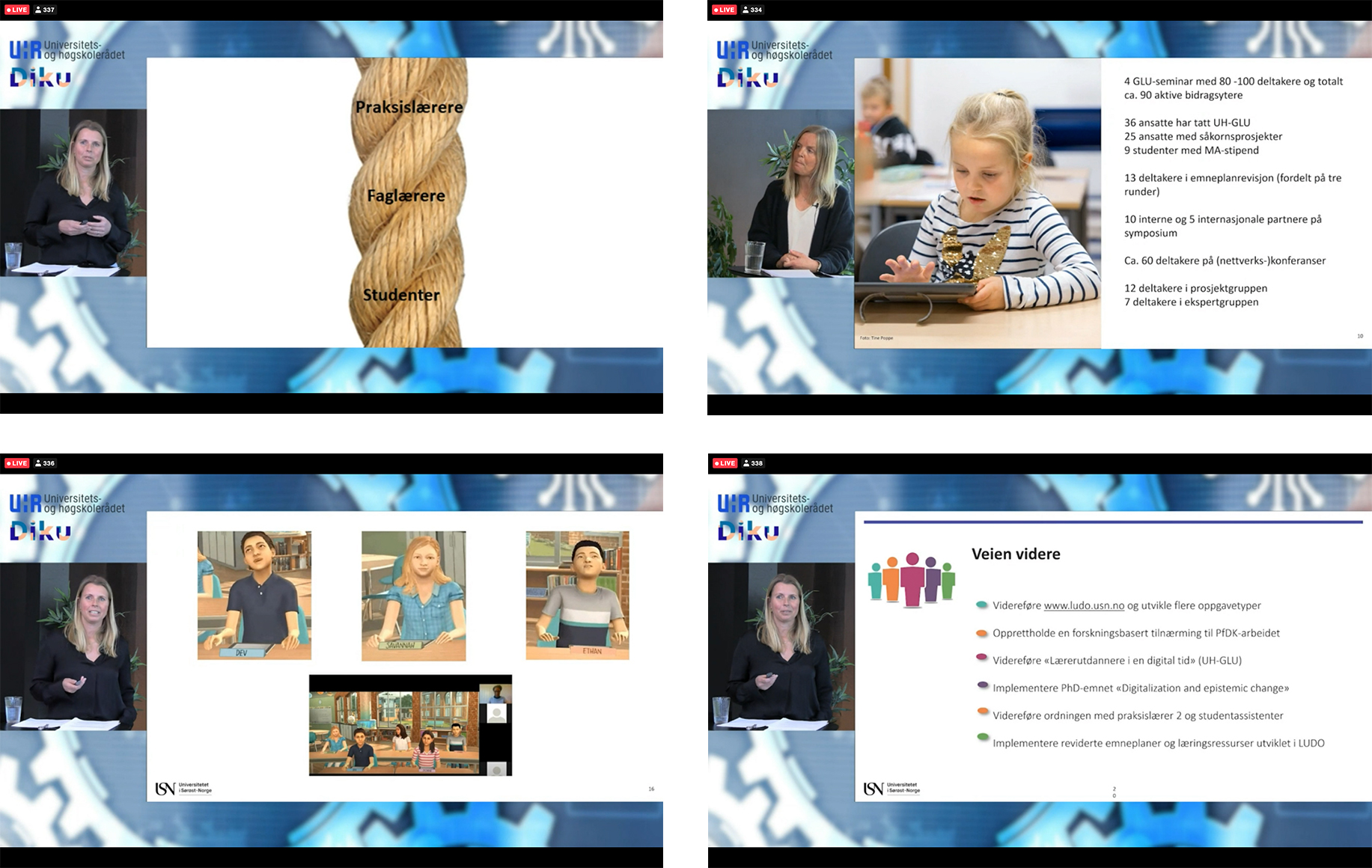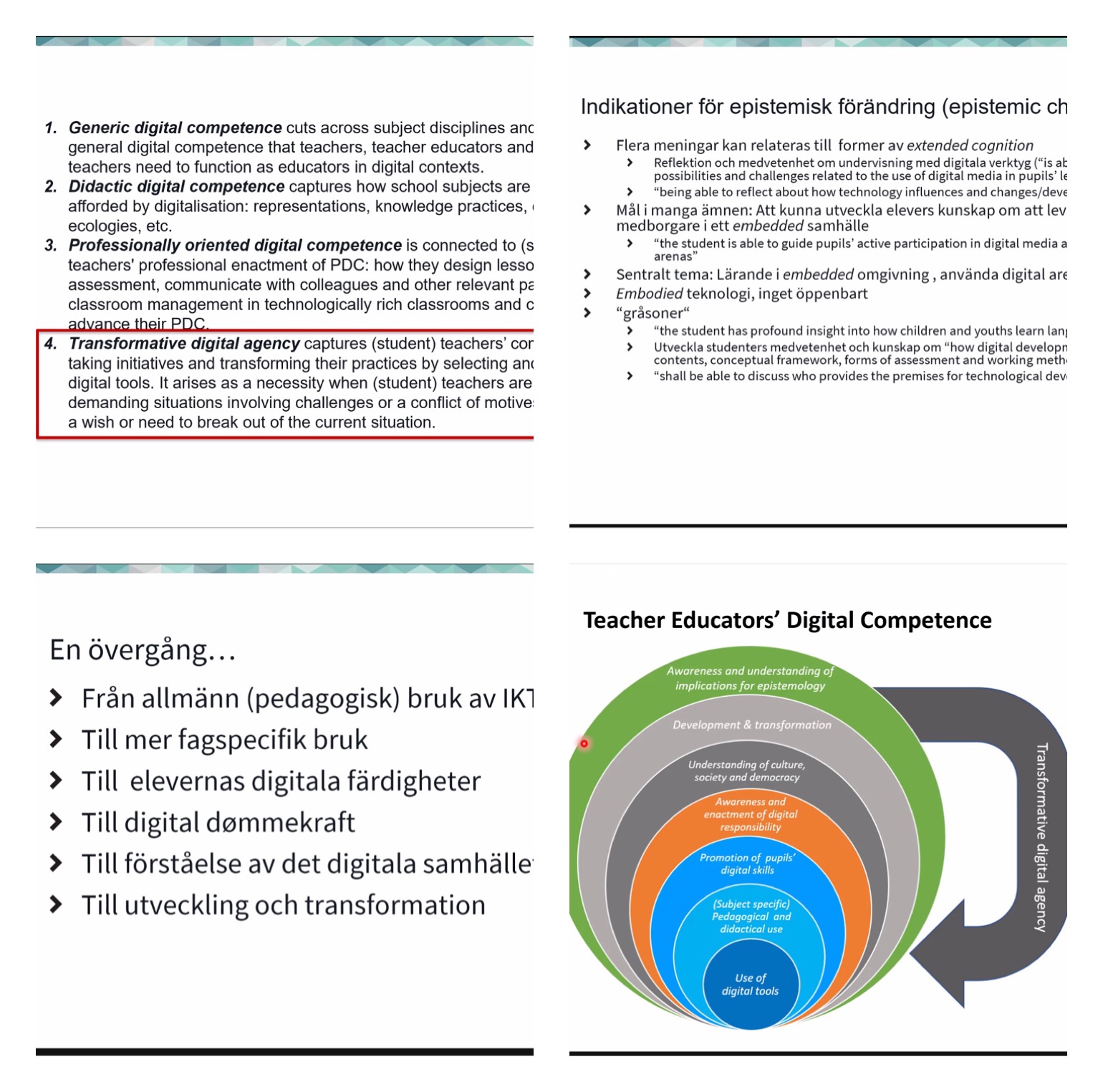Lærerutdanningskonferansen 2021 - Day 1
Today, I'm attending the first day of an online conference, Lærerutdanningskonferansen 2021, arranged by Norwegian Universitets- og Høgskolerådet. The first keynote presentation, Digitalisering og transformasjon i lærerutdanningen (Toril Aagaard and Agnete Andersen Bueie, Universitetet i Sørøst-Norge), argues that digitisation in teacher education generates transformation. They show examples of how digital technology kan be used to enhance active learning and relevance in the education.
The next presentation consists of a pre-recorded interview between Fredrik Mørk Røkenes, NTNU, Andreas Lund and Ola Erstad, Universitetet i Oslo. They discuss historical aspects of profession-based digital competence in teacher education.
The next session is a parallel one and I attend Ilka Nagel's (Høgskolen i Østfold) presentation on "Digital competens in local steering documents in Norwegian teacher training, at which she discusses the expectations on the skills and competences of teacher educators.
The participants discuss attitudes to and solutions for "digital Bildung" from their own contexts and provide potential examples for others to follow. To ensure a high level of competence among faculty, both interest (in digitalisation) and a systematic approach to reach an adequate level of competence is needed. Some of the panel participants use research and/or more explorative, concrete projects to push teacher educators to move further in their own knowledge of digital tools and digitalisation. They stress that this must be a required part of syllabi as well as day-to-day work. How do we move towards a higher level of inclusion?The following session is again parallel. Introduced by Lise Dissing Møller, Profesjonshøgskolen i København, all presentations are themed "the future classroom in teacher education" and are highly hands-on, with concrete examples of digital work in schools. I decide to attend Lisbet Rønningsbakk's, UiT Norges arktiske universitet, presentation on "digital future smithy – a room for exploration, play, and learning." Rønningsbakk showcases many different ways of working with digital technology in school, at first in the form of a movie and then as she continues to develop her project's ideas in her talk. She talks about the need to frame the practice of teaching and learning through a digital and physical environment.
The next presentation is a very short movie introduced by Kjerstin Breistein Danielsen, Universitetet i Agder. It focuses on the network for "the future classroom in teacher education" [Faglig nettverk for Fremtidens Klasserom i lærerutdanningene] and shows how they are working with this in Copenhagen.
Today's last speaker is Torunn Strømme, Universitetet i Oslo, and her talk is on digital integration of video evaluation on various arenas. An app, DIVA, has been developed to help pre-service teachers evaluate themselves and their work in the classroom, while incorporating an automated handling of giving consent by those being filmed.
The next presentation consists of a pre-recorded interview between Fredrik Mørk Røkenes, NTNU, Andreas Lund and Ola Erstad, Universitetet i Oslo. They discuss historical aspects of profession-based digital competence in teacher education.
The next session is a parallel one and I attend Ilka Nagel's (Høgskolen i Østfold) presentation on "Digital competens in local steering documents in Norwegian teacher training, at which she discusses the expectations on the skills and competences of teacher educators.
How is digital competence addressed in local curricula and what is expected from teacher educators (TEDs) in terms of preparing student teachers for epistemic changes?She discusses the concept of Digital Bildung, as well as potential digital standard levels for teacher educators, and how we might work with digital tools as "partners," not just tools. In order to prepare pre-service teachers, we need to build on the digital compentence they already have.After lunch, Synnøve Hedemann Amdam (Høgskolen i Volda) leads a panel consisting of institute leader Torberg Falch (NTNU), dean Hilde Inntjore (Universitetet i Agder), institute leader Siw Skrøvset (UiT Norges arktiske universitet) and program coordinator Åshild Vassend Holm (Høgskolen i Innlandet). The topic is how to lead the digitalisation work in teacher education.
The participants discuss attitudes to and solutions for "digital Bildung" from their own contexts and provide potential examples for others to follow. To ensure a high level of competence among faculty, both interest (in digitalisation) and a systematic approach to reach an adequate level of competence is needed. Some of the panel participants use research and/or more explorative, concrete projects to push teacher educators to move further in their own knowledge of digital tools and digitalisation. They stress that this must be a required part of syllabi as well as day-to-day work. How do we move towards a higher level of inclusion?The following session is again parallel. Introduced by Lise Dissing Møller, Profesjonshøgskolen i København, all presentations are themed "the future classroom in teacher education" and are highly hands-on, with concrete examples of digital work in schools. I decide to attend Lisbet Rønningsbakk's, UiT Norges arktiske universitet, presentation on "digital future smithy – a room for exploration, play, and learning." Rønningsbakk showcases many different ways of working with digital technology in school, at first in the form of a movie and then as she continues to develop her project's ideas in her talk. She talks about the need to frame the practice of teaching and learning through a digital and physical environment.
The next presentation is a very short movie introduced by Kjerstin Breistein Danielsen, Universitetet i Agder. It focuses on the network for "the future classroom in teacher education" [Faglig nettverk for Fremtidens Klasserom i lærerutdanningene] and shows how they are working with this in Copenhagen.
Today's last speaker is Torunn Strømme, Universitetet i Oslo, and her talk is on digital integration of video evaluation on various arenas. An app, DIVA, has been developed to help pre-service teachers evaluate themselves and their work in the classroom, while incorporating an automated handling of giving consent by those being filmed.











Comments
Post a Comment